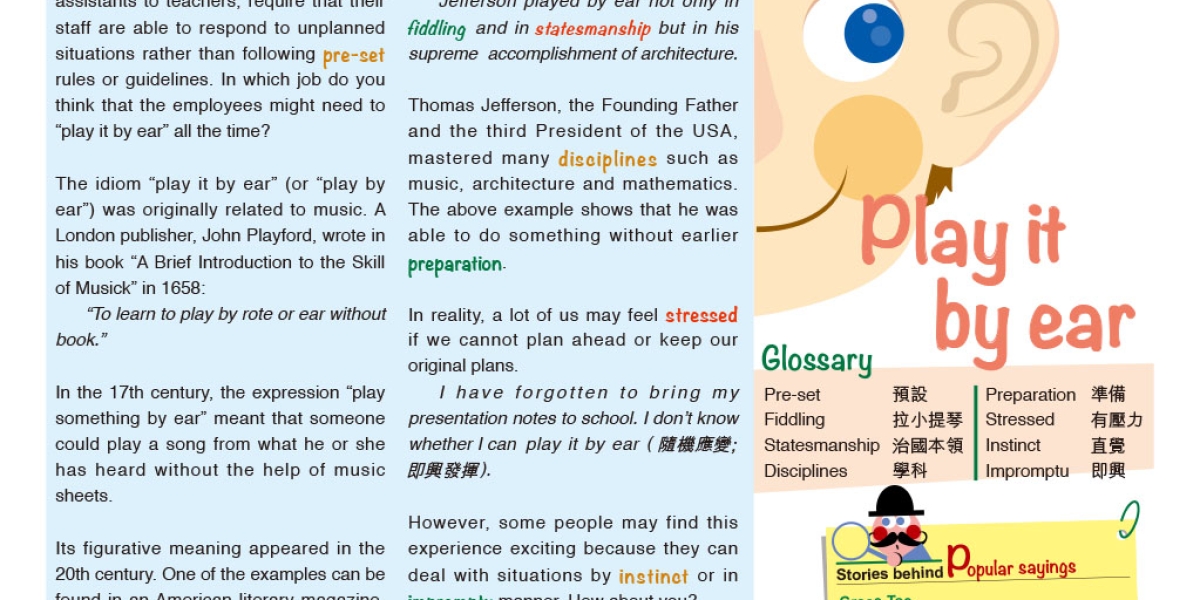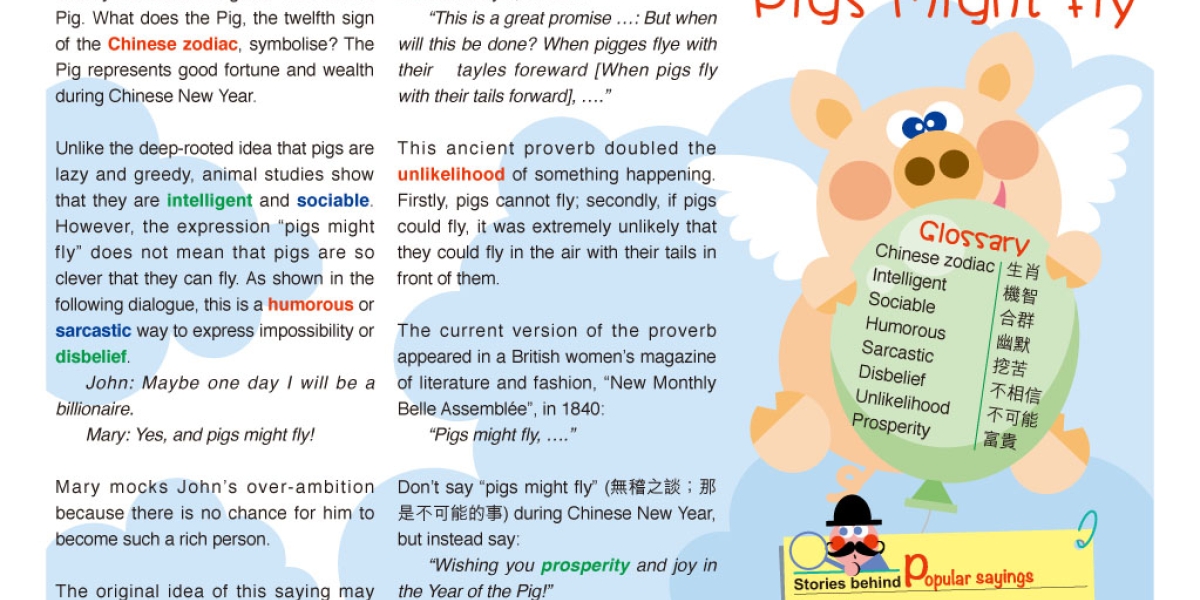昔日文章


Stories Behind Popular Sayings
2019.05.24
Play it by ear
Nowadays, a lot of jobs, from sales assistants to teachers, require that their staff are able to respond to unplanned situations rather than following pre-set rules or guidelines. In which job do you think that the employees might need to “play it by ear” all the time?
The idiom “play it by ear” (or “play by ear”) was originally related to music. A London publisher, John Playford, wrote in his book “A Brief Introduction to the Skill of Musick” in 1658:
“To learn to play by rote or ear without book.”
In the 17th century, the expression “play something by ear” meant that someone could play a song from what he or she has heard without the help of music sheets.
Its figurative meaning appeared in the 20th century. One of the examples can be found in an American literary magazine, “North American Review”, in 1922.
Jefferson played by ear not only in fiddling and in statesmanship but in his supreme accomplishment of architecture.
Thomas Jefferson, the Founding Father and the third President of the USA, mastered many disciplines such as music, architecture and mathematics. The above example shows that he was able to do something without earlier preparation.
In reality, a lot of us may feel stressed if we cannot plan ahead or keep our original plans.
I have forgotten to bring my presentation notes to school. I don’t know whether I can play it by ear ( 隨機應變; 即興發揮).
However, some people may find this experience exciting because they can deal with situations by instinct or in impromptu manner. How about you?
Glossary
Pre-set
預設
Fiddling
拉小提琴
Statesmanship
治國本領
Disciplines
學科
Preparation
準備
Stressed
有壓力
Instinct
直覺
Impromptu
即興


Stories Behind Popular Sayings
2019.04.26
Hook, line, and sinker
An international company announced that it was committed to the Hong Kong financial market “hook, line, and sinker” after it made huge profits in 2018. The idiom “hook, line, and sinker” means “completely”. In other words, this company is very willing to make investment in Hong Kong.
What do you think the three items “hook, line, and sinker” were originally associated with? They refer to angling, which is the sport or hobby of fishing. This leisure activity needs a hook, a fishing line and a lead weight (or a sinker) which keeps the fishing line under the water. When a fish nibbles at the bait on the hook, it is caught straightaway.
The idiom first appeared in an autobiography of Thurlow Weed, an American politician, in the 19th century.
“We are gone, hook, line, and sinker.”
Based on the idea that a fish is so hungry that it eats the bait without any doubts, this idiom is commonly used with the word “swallow”. The following example means that many Hong Kong people do not accept the changes to the fugitive law.
The general public in Hong Kong are not swallowing the proposed amendments to the extradition law hook, line, and sinker.
The idiom also implies a deception. In the following example, the old woman was tricked into believing the fraudster unquestioningly.
The conman was so clever that the poor old lady fell for his story hook, line, and sinker.(完全相信) .
Note that the comma after the word “line” is optional: “hook, line and sinker”.
Glossary
Angling
釣魚
Lead
鉛
Sinker
釣絲上的鉛錘
Nibbles
一點點地咬
Bait
餌
Fugitive
逃犯
Extradition
引渡逃犯
Deception
欺詐


If you were...
2019.03.01
What would you do if you were Paul?
Last Friday was Teachers’ Development Day, there was no school. Paul made use of the long weekend to visit his grandma who lives by herself in Cheung Chau. The two planned to take it relaxingly and dine out at different outlets. There are some small but gimmicky(有噱頭) food stalls which earn a reputation(有名氣).
All went well until Saturday afternoon. Paul was a couch potato(沙發裡看電視的人)in front of the television while Grannie enjoyed her peanuts, also watching the same Korean anime(韓國動漫). All of a sudden, a loud explosion(爆炸聲)came from the kitchen. Both raced(衝去)to see what happened. Oh no, water was rushing out(沖出)from the pipe(水渠)underneath the sink! The water was so rapid(湍急)that Paul had to use his whole chest(胸膛)to cover the hole on the pipe. He shouted to Grannie to get his phone and call his father for help. It took quite a long time before a plumber(水喉師傅)appeared. The tiny flat was flooded and Grannie took Paul out to eat with her heart sunk(沒有心情), both wrapped in a big towel.
What would you do if you were Paul?
If the flat were all flooded, I would take my grandma back to my place and let my parents fix the issue. If she refused to go with me, I’d still leave as she would have one less thing on her mind to worry about. Not causing any trouble would be the best I would offer.
I’d not let my spirit sink with hers. I’d console(安慰)my grandma that it was just a perfect timing the accident happened while I were around. I’d invite her to thank God with me in a short prayer and then listen to her preferences in following up with the issue. I would comply(順從).


Stories Behind Popular Sayings
2019.01.25
Pigs might fly
Chinese people around the world will shortly be celebrating the Year of the Pig. What does the Pig, the twelfth sign of the Chinese zodiac, symbolise? The Pig represents good fortune and wealth during Chinese New Year.
Unlike the deep-rooted idea that pigs are lazy and greedy, animal studies show that they are intelligent and sociable. However, the expression “pigs might fly” does not mean that pigs are so clever that they can fly. As shown in the following dialogue, this is a humorous or sarcastic way to express impossibility or disbelief.
John: Maybe one day I will be a billionaire.
Mary: Yes, and pigs might fly!
Mary mocks John’s over-ambition because there is no chance for him to become such a rich person.
The original idea of this saying may come from the writing of Walter Haddon, a British lawyer, in 1581.
“This is a great promise …: But when will this be done? When pigges flye with their tayles foreward [When pigs fly with their tails forward], ….”
This ancient proverb doubled the unlikelihood of something happening. Firstly, pigs cannot fly; secondly, if pigs could fly, it was extremely unlikely that they could fly in the air with their tails in front of them.
The current version of the proverb appeared in a British women’s magazine of literature and fashion, “New Monthly Belle Assemblée”, in 1840:
“Pigs might fly, ….”
Don’t say “pigs might fly” (無稽之談;那是不可能的事) during Chinese New Year, but instead say:
“Wishing you prosperity and joy in the Year of the Pig!”
Glossary
Chinese zodiac
生肖
Intelligent
機智
Sociable
合群
Humorous
幽默
Sarcastic
挖苦
Disbelief
不相信
Unlikelihood
不可能
Prosperity
富貴


